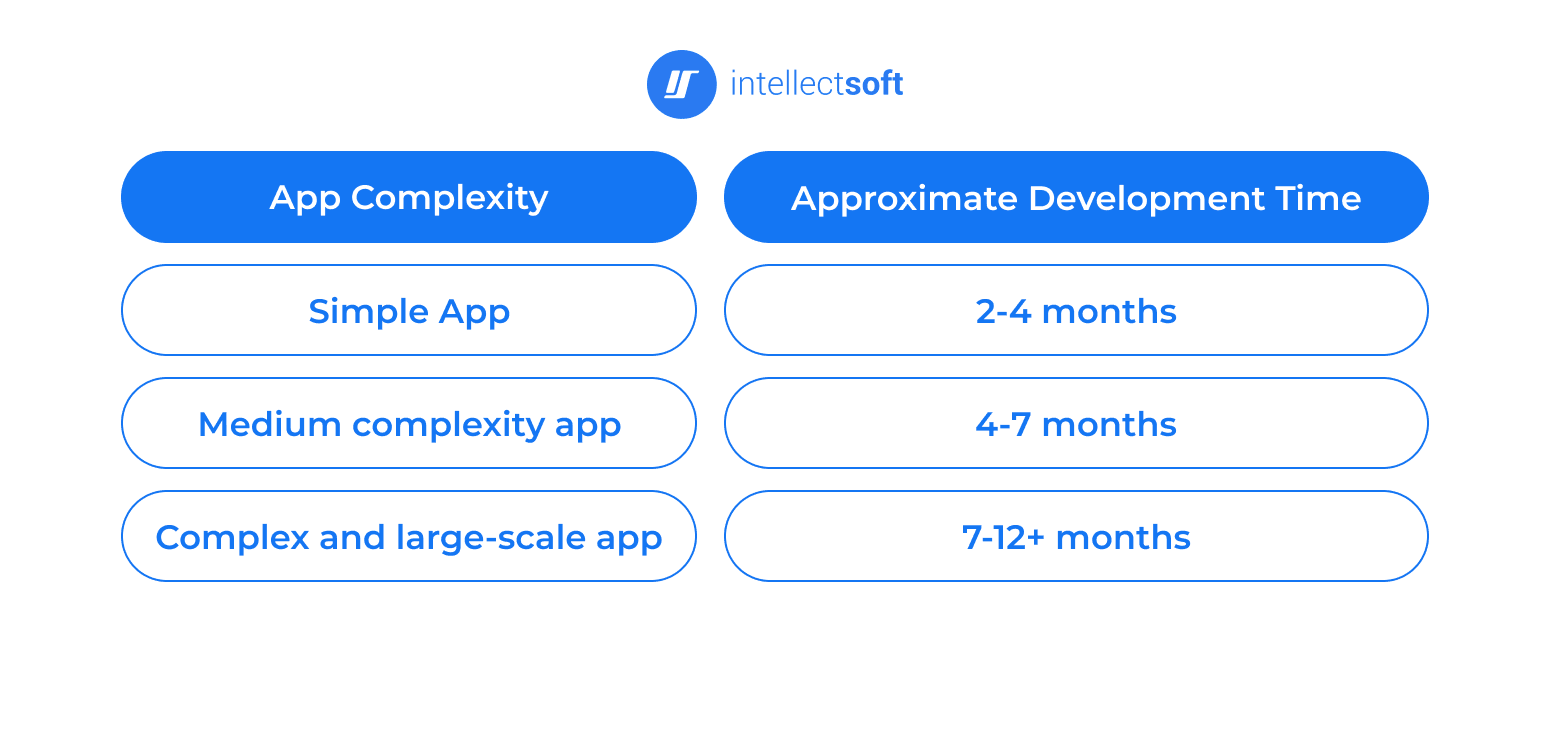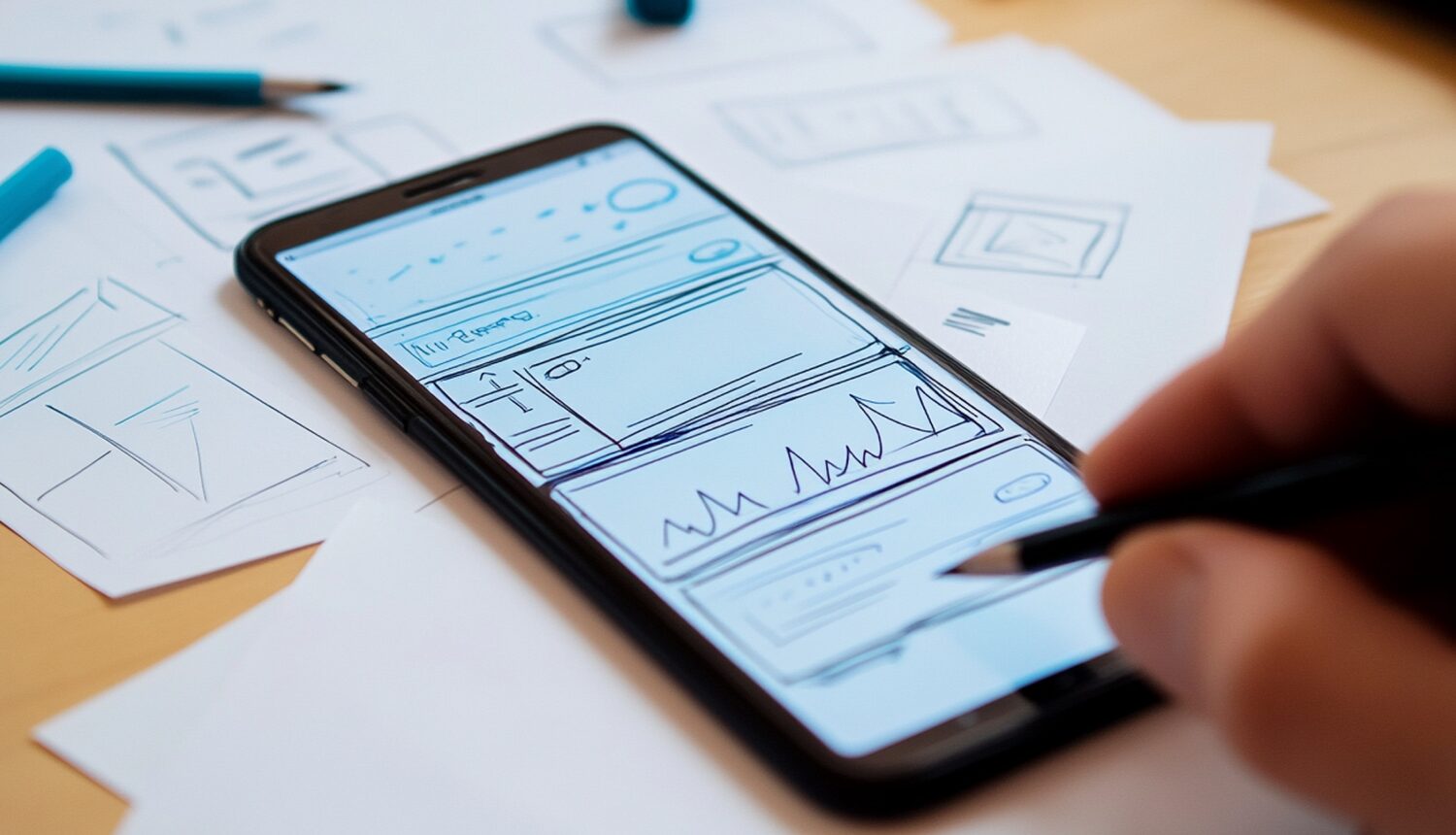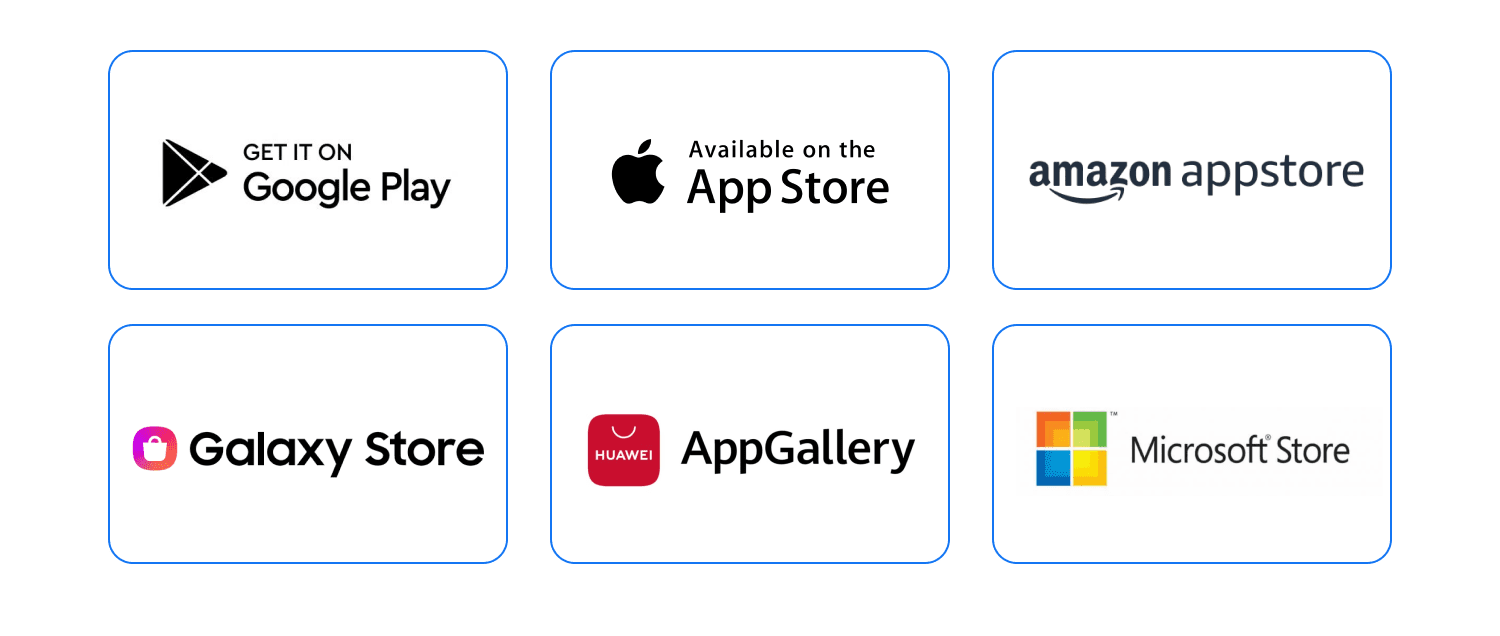Mobile apps play an important role for businesses in almost every industry. Whether you’re developing a simple utility app, a social networking platform, or a complex business solution, mobile apps provide companies with an efficient way to connect with users, streamline operations, and deliver innovative services directly to consumers. But before embarking on the app development process, a key question often arises: How long does it take to develop an app?
The timeline for developing a mobile app can vary significantly, depending on the app idea, its complexity, the specific features required, and the resources available. Typically, the mobile app development timeline spans several months to a year or more. In this article, we’ll explore the typical app development timeline, break down the key stages of the app development process, highlight the factors that influence development time, and offer practical tips to help you streamline the process. Understanding these key elements will allow you to set realistic expectations and plan for a successful app launch.
Mobile App Development Timelines
App development timelines are heavily influenced by the app’s complexity and whether it’s targeted for internal operations or external users. Here’s an overview of the typical timeframes for different levels of app complexity:

Each level of complexity involves distinct requirements that can affect the app development timeline. Let’s look closer at each type:
Simple App
A simple app, typically developed in 2-4 months, includes basic functions and minimal design, such as a utility or informational app. It may not require backend integration, and its feature set is generally limited. A simple app development timeline can range from two to four months if the specifications are clear and the app does not require extensive testing or unique design requirements.
Medium Complexity App
Medium complexity apps often include integrations with external services, moderate design complexity, and custom user interface elements. Examples might include eCommerce apps with payment gateways or social networking features, which require a backend for user management, data processing, and push notifications. Medium complexity apps, typically developed in 4-7 months, require a balance of solid functionality, appealing design, and effective integration.
Complex or Large-Scale App
Complex apps with advanced features, such as on-demand apps, large-scale social networks, or enterprise-level solutions, require significant development time. These apps often involve high-security requirements, real-time data processing, extensive API integrations, and support for a large user base. These projects, requiring a more sophisticated approach to architecture, backend systems, and rigorous testing, can take anywhere from 7-12+ months to develop. Additionally, further development and updates may be required after the initial launch.
Factors Influencing App Development Timelines
While app complexity is a significant factor in determining development time, several other elements can also affect how long it takes to develop an app. These factors can either accelerate or slow down the process, depending on the decisions made during the app development process. Here are the key factors to consider:
Platform Selection
The choice of iOS, Android, or cross-platform development affects the app development timeline due to differing technical requirements and testing needs.
Budget and Resources
A higher budget enables a larger, experienced team, accelerating development, while limited resources may slow the process.
Team Composition and Experience
A skilled, well-composed team speeds up development, whereas a smaller or less experienced team may encounter delays.
App Features and Functionality
Complex features increase development time, while simpler apps can be built more quickly.
Design Requirements
Advanced design elements require longer timelines due to the added stages of prototyping, feedback, and optimization.
Third-Party Integrations
Integrating external APIs or services adds time for setup, configuration, and testing.
Testing and QA
Thorough testing phases, especially for complex apps, extend the timeline to ensure a quality product.
Key Stages and Timelines of App Development
To give a clearer picture of the app development process, here’s a breakdown of the typical stages of app development, along with estimated timelines for each:
Market Research
The research phase, taking 2 to 3 weeks, involves gathering insights about the market, competitors, and target audience to ensure the app meets user needs and fills a gap in the market. This step helps define the app’s direction and streamline the app development timeline.
Requirements Gathering
The initial phase, lasting 2 to 3 weeks, focuses on defining the app’s purpose, target audience, and key functionality. It involves aligning with stakeholders, analyzing user needs, and outlining project objectives. This step ensures a clear direction and a solid foundation for the subsequent phases of app development.
Concept Testing
Concept testing, lasting 1 to 2 weeks, involves assessing the app’s demand and feasibility through surveys, interviews, and feedback. This step is crucial for refining the idea and ensuring it aligns with user expectations before proceeding to develop an app.
Product Roadmap
Creating a product roadmap, lasting 3 weeks, outlines the app’s goals, features, and unique selling points. This phase ensures the project stays aligned with business objectives and focuses on delivering value throughout the app development process.
Wireframing
Wireframing, taking 2 weeks, involves creating low-fidelity mockups to visualize the app’s layout and interaction flow. This helps provide stakeholders with a tangible view and allows for early design adjustments based on feedback before finalizing the app architecture.
Prototype Testing
Prototype testing, lasting 1 to 2 weeks, gathers feedback from users or stakeholders to refine the app’s structure and flow. This stage ensures that the design aligns with user expectations and helps identify areas for improvement before final design.
UI/UX Design
The design phase, taking 1 to 2 months, focuses on creating the app’s user interface and experience, including visuals like icons and buttons. Multiple iterations are often necessary to ensure the app is both functional and visually appealing.
App Development
Development, lasting 6 to 8 months, includes both front-end and back-end coding, database setup, and API integration. This stage forms the app architecture and ensures all functionalities are properly implemented, shaping the foundation for a smooth app development process.
Launch Preparation
The final preparation phase, taking 3 to 4 weeks, involves bug fixing, and app store submission. The timeline varies depending on readiness, but this critical stage ensures the app is polished and prepared for public release, marking the final step in the app development timeline.
Mobile Apps Intellectsoft created and how long did it take
Luxury Hotel App Created Over 5 Years
We initially released a smart room app for a luxury Asian resort chain with core features like suite amenity controls and service ordering. Over the next five years, we enhanced and expanded its functionality, transforming it into a comprehensive tool that embodies the chain’s exceptional hospitality.
Social Services App Built in 1 Year
In one year, our team created a gamified app designed to foster community engagement on equity and reform. The app encourages users to share experiences and provides valuable insights to policymakers and leaders. Its thoughtful design ensures diverse voices are heard, supporting informed and impactful decision-making.
Amenity Management App Developed in 6 Months
Our team delivered a cross-platform app for a leading amenity management company in just six months. With features like multi-vendor scheduling, instant bookings, and wellness service options, the app made accessing services effortless for users while helping the client streamline operations and elevate customer satisfaction.
How to Speed Up the App Development Process
Speeding up the app development process is about finding the right balance between efficiency and quality. By employing strategic decisions, optimized workflows, and leveraging the right tools, you can ensure that the development process moves swiftly without compromising the app’s functionality. Below are several tips to help expedite the mobile app development timeline:
Focus on MVP
One of the most effective ways to speed up the development stage is by creating a Minimum Viable Product. The MVP focuses on delivering the core features and functionalities necessary for the app to function, without getting bogged down by unnecessary features or perfect design. By building an MVP, you can quickly launch the app to a limited audience, gather feedback, and make improvements.

Select the Right Tech Stack
Choosing the right technology stack is critical in speeding up the app development process. When selecting a tech stack, consider factors like your app’s functionality, the team’s expertise, and long-term scalability. Leveraging proven, reliable technologies can significantly reduce development time.
Leverage Agile Development
Agile development methodologies can be a game-changer when it comes to speeding up the process. Agile breaks the project into small, manageable tasks, and teams work on these tasks in short, iterative cycles.
Automate Testing
Automated testing is another key tactic for speeding up app development. Manual testing can be time-consuming, especially as the app becomes more complex. Automated tests, on the other hand, run quickly and can be repeated frequently, catching errors early and ensuring the app remains functional through each stage of development.
Hire Skilled Developers
Experienced developers can make a significant difference in speeding up the app development timeline. Skilled professionals bring expertise, problem-solving capabilities, and a deeper understanding of the development environment, which helps them identify potential issues early and address them efficiently.
Streamline Communication and Collaboration
Clear and efficient communication is essential to speeding up the app development process. Establishing a streamlined workflow where team members can easily share updates, feedback, and progress reports is crucial. Regular meetings and status updates help ensure everyone is aligned and working toward the same goals.
Prioritize Essential Features and Postpone Non-Essential Ones
Instead of trying to pack every feature into the initial version of the app, focus on the must-have features that are crucial for the app’s success.
Use Pre-built Solutions and Third-party Integrations
Instead of building everything from scratch, consider using pre-built solutions and third-party integrations for features like payment gateways, authentication systems, or data storage. Many of these services offer ready-made APIs or SDKs that can be quickly integrated into your app, saving development time.
Focus on UI/UX Simplicity
While it’s important to ensure that the app is aesthetically pleasing and intuitive, opting for a minimalistic design can streamline the design process and reduce the time spent on revisions.
Monitor and Optimize Progress Continuously
It’s essential to monitor the development progress and continuously optimize the workflow. Regular assessments help identify any areas where bottlenecks are occurring and allow for immediate corrective action.
Common Challenges and Solutions
Developing an app involves navigating several common challenges that can impact timelines and overall project success. Here are key issues that often arise and practical ways to address them effectively.
Changing Requirements
Challenge
Requirements can evolve due to shifting market trends or new stakeholder user feedback. Although adapting can improve the app’s value, frequent changes often lead to “scope creep”, which extends timelines and creates inefficiencies. This raises the question, how long does it take to develop an app if the requirements are constantly changing?
Solution
Define the project requirements clearly and secure stakeholder buy-in from the start to ensure alignment on goals. This helps minimize misunderstandings and reduces the chances of major changes later on. Additionally, frequent check-ins and sprint reviews help the team stay aligned and responsive to updates without derailing the app development process.
Technical Constraints
Challenge
Technical limitations with platforms, third-party integrations, device capabilities, and security requirements can introduce unexpected delays. For example, integrating complex APIs or ensuring cross-platform compatibility can slow progress if not planned for.
Solution
Anticipate and plan for technical constraints early. Choose a flexible tech stack that supports your app’s needs and allocate time to test integrations and device compatibility. Planning for these potential issues in the mobile app development timeline helps the team manage technical risks without delaying the project’s overall schedule.

Testing Delays
Challenge
Thorough testing is crucial but can be time-consuming, especially in complex apps where bugs or performance issues may require extensive troubleshooting. Without proper planning, testing can significantly extend app development timeline.
Solution
Implement continuous testing, where tests are conducted throughout the development lifecycle. Automated testing tools, such as those for unit and integration testing, can handle repetitive tasks and speed up detection of issues, saving time compared to manual testing. Continuous testing ensures issues are found and resolved early, keeping the project on track.
Limited Resources and Team Availability
Challenge
Limited resources, budget constraints, or key team members’ availability issues can delay project phases. Specialized skills like UX design or backend expertise may be scarce, impacting development speed and quality.
Solution
Ensure the project team includes dedicated members with relevant expertise and consider temporary hires or consultants for specialized tasks. Regular progress assessments can reveal bottlenecks early, allowing the team to allocate additional resources or adjust priorities as needed to stay on schedule.
Communication and Collaboration Gaps
Challenge
Miscommunication or collaboration issues, particularly in distributed teams, can lead to misunderstandings, slower decision-making, and misaligned priorities, resulting in delays and rework.
Solution
Use collaborative tools such as Slack, Trello, or Asana to maintain clear, consistent communication. Regular check-ins and progress updates ensure alignment across the team, reducing misunderstandings and keeping the project moving forward smoothly.
App Store Approval Delays

Challenge
After the app is developed, getting approval from app stores can take time. If the app does not meet specific guidelines, it may face rejections, delaying app release.
Solution
Review platform guidelines early in the project and conduct thorough pre-launch testing. Prepare all necessary documentation for submission, and be ready to address any platform feedback promptly. A smooth submission process can help avoid potential delays during this final phase.
Best Practices for Mobile App Development Process
Following best practices can help streamline the app development process and lead to a more successful and impactful product. Here are core principles to keep in mind:
Define a Clear Objective
Setting a well-defined objective with specific goals, a target audience, and clear purpose creates a strong foundation for development, ensuring that every decision aligns with business needs and user expectations to maximize impact.
Conduct Thorough Research
In-depth research into user needs, competitor analysis, and industry trends informs the app’s core features, enabling developers to identify differentiators and make strategic design decisions that resonate with users and reduce costly iterations.
Prioritize User Experience
Designing a thoughtful UX, including intuitive navigation, fast load times, and accessibility, helps users feel comfortable and engaged, fostering higher satisfaction and loyalty, which leads to better user retention and organic growth.
Balance Innovation with Practicality
Building an MVP first allows developers to focus on the app’s core value, efficiently allocate resources, and gather critical user feedback that can guide gradual, data-driven expansions to meet evolving demands.
Plan for a Long-Term Process
Beyond the initial launch, a long-term plan for regular updates, user support, and feature improvements helps the app stay relevant, competitive, and responsive to changing market conditions, ensuring sustained growth and user satisfaction.
Conclusion
Creating a mobile app is a significant investment in both time and resources, and each stage of development is essential to its success. From initial research and validation through to design, development, and testing, each phase requires attention to detail and strategic planning. Understanding the typical timelines and factors that influence the app development process, such as app complexity, technical requirements, and resource availability, allows teams to set realistic goals and manage expectations effectively. Knowing how long does it take to develop an app helps teams better plan and allocate resources across the app development timeline.
Following best practices, such as defining clear objectives, prioritizing user experience, and embracing Agile methodologies, can help ensure a smoother, more efficient app development process and ultimately lead to an app that resonates with users and achieves its intended goals. With a solid roadmap, commitment to quality, and flexibility to adapt to feedback, your app has the potential to stand out in the competitive app market and deliver real value to its users, all while keeping the mobile app development timeline on track.
FAQ
How long does it take to develop an app like Uber?
Developing a complex app like Uber, with features like GPS tracking, notifications, payments, and geolocation, typically takes 12+ months. The timeline varies based on team expertise, customization, and infrastructure needs. Additional features like ride scheduling and diverse payment options can extend development.
How much time is needed to build an Android app?
The time it takes to develop an Android app can vary significantly depending on its complexity and feature set. For a simple app, such as one with basic functionality, it may take 2 to 4 months. A medium-complexity app, such as one with multiple user interactions, database integration, and APIs, might require 4 to 7 months. More complex Android apps, with advanced features like real-time data synchronization, custom UI/UX design, integrations with third-party services, or offline functionality, can take anywhere from 7 to 12+ months. Additional factors, such as testing, device compatibility checks, and ensuring compliance with Google’s guidelines, can also affect the mobile app development timeline.
What’s the typical timeline for developing an iOS app?
Developing an iOS app typically takes 8 months or more, depending on the app’s complexity. Simple apps with basic functionality can be built in 3-4 months, while medium-complexity apps, such as e-commerce platforms or social networks, usually take 5-7 months. More advanced apps, incorporating features like AI, custom APIs, or intricate backend systems, may require 12+ months. Each stage of development is designed to ensure the final product meets user needs and business objectives.
The process generally includes five key stages: concept development, where goals and features are outlined; UI/UX design, focusing on creating an intuitive, user-friendly interface; development, which involves building the app’s frontend, backend, and integrations; testing and QA, ensuring the app runs smoothly across devices; and finally, launch and deployment, where the app is submitted to the App Store and prepared for release. This streamlined approach ensures a high-quality app that delivers a great user experience.
How long does it take to develop a cross-platform app?
Cross-platform apps built with frameworks like Flutter or React Native generally save time by sharing code across iOS and Android. Simple apps may take 3-6 months, medium-complexity apps 6-9 months, and complex apps with customizations 9-12 months or more. While development is faster than separate native apps, extra time may still be needed for platform-specific optimization.
Subscribe to updates
Source link











